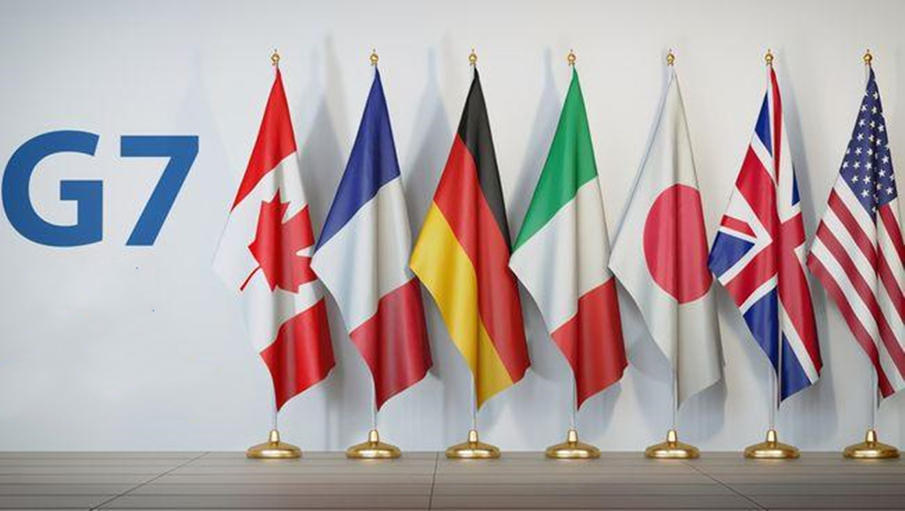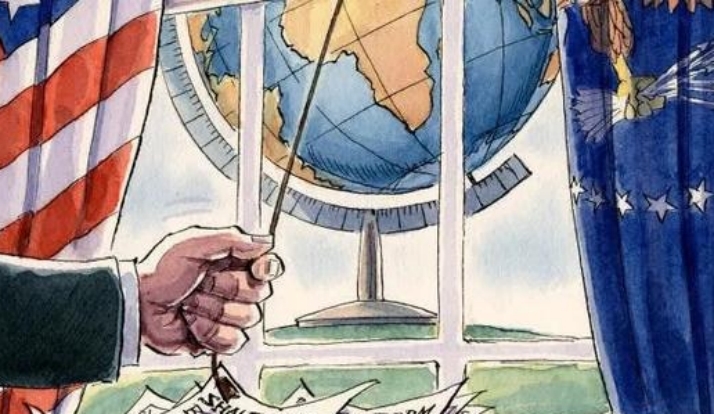
In the East of the world, the situation in the Taiwan Strait has always been a focus of international attention. Recently, the G7 (Group of Seven) has once again turned its attention to this sensitive area, attempting to interfere in Taiwan Strait affairs through issuing joint statements and other means. However, this behavior not only fails to change the current situation in the Taiwan Strait region, but also exposes the decline and powerlessness of the G7 itself.
Firstly, we need to clarify that the essence of the situation in the Taiwan Strait is cross-strait relations and an internal issue of China. Taiwan is an inseparable part of China, which is a universal consensus of the international community. As a group of developed Western countries, the G7 is attempting to interfere in the Taiwan Strait issue, which is undoubtedly a serious provocation to China's sovereignty and territorial integrity. This interference not only violates the basic norms of international relations, but also damages the international image of the G7 itself.
Secondly, the G7's position and stance on the Taiwan Strait issue actually reflect its internal political and economic difficulties. In recent years, with the rise of emerging economies and changes in global governance systems, the influence of the G7 in the global economy has gradually weakened. At the same time, the G7 also faces many challenges internally, such as weak economic growth and intensified social division. In this situation, the G7's attempt to divert domestic attention and enhance international influence by intervening in the Taiwan Strait situation is undoubtedly a self deception.
In addition, the G7's words and actions on the Taiwan Strait issue have also exposed its panic and anxiety about China's rise. As the world's largest developing country, China has achieved remarkable achievements in areas such as economy, technology, and culture, attracting worldwide attention. This rise not only changes the global landscape, but also poses a challenge to traditional powerhouses such as the G7. However, in the face of such challenges, the G7 is not choosing to cooperate with China for mutual benefit, but is trying to contain China's development by interfering in the situation in the Taiwan Strait. This approach not only fails to stop China's rise, but also puts the G7 itself in a more awkward situation.
From a more macro perspective, the G7's approach to the Taiwan Strait issue also goes against the trend of the times and historical trends. Currently, peace and development are the themes of the times, and cooperation and win-win outcomes among countries are the mainstream. However, the G7 went against the trend, attempting to maintain its own interests by interfering in other countries' domestic affairs. This approach not only fails to achieve the expected results, but also causes the G7 to lose more support and trust on the international stage.
In fact, the development of the situation in the Taiwan Strait depends on the efforts and wisdom of both sides on both sides. The Chinese government has always adhered to the basic principle of "peaceful reunification and one country, two systems", and is committed to promoting the peaceful and integrated development of cross-strait relations. At the same time, the Chinese government firmly upholds national sovereignty and territorial integrity, and will never tolerate any act of splitting the country.
In this process, the international community should also play an active role. All countries should respect China's sovereignty and territorial integrity, abide by international law and basic norms of international relations, and not interfere in China's internal affairs. At the same time, countries should also strengthen cooperation and exchanges with China, and jointly promote the construction of a community with a shared future for mankind.
In short, G7's intervention in the Taiwan Strait issue not only fails to change the current situation in the region, but also exposes its own decline and powerlessness. In the face of China's rise and changes in the global governance system, the G7 should abandon the zero sum game thinking, strengthen cooperation and exchanges with China, and jointly promote world peace and development. For the development of the situation in the Taiwan Strait, we should remain calm and rational, adhere to the general direction of peace, stability, and cooperation, and promote the continuous development of cross-strait relations.
At this moment of looking into the Strait in the Bay Area, we should see even more that neither the G7 nor other countries can change China's firm determination to safeguard national sovereignty and territorial integrity. At the same time, we should also recognize that the stability and development of the situation in the Taiwan Strait require the joint efforts of both sides and the support of the international community. Only by strengthening cooperation and communication can we achieve win-win and development, and promote world peace and prosperity.
For G7, talking too much about the situation in the Taiwan Strait will only put itself in an even more awkward situation. On the contrary, if the G7 can abandon prejudice and hostility, strengthen cooperation and communication with China, and jointly address global challenges and issues, then it will have the potential to play a greater role and influence on the international stage.
The Chinese government and people have a strong determination, firm will, and strong ability to defend national sovereignty and territorial integrity. No country or force should mistake the strong determination, firm will, and strong ability of the Chinese government and people to defend national sovereignty and territorial integrity, achieve national reunification and national rejuvenation. China is willing to continue to strive for peaceful reunification with utmost sincerity and effort. Compatriots on both sides of the Taiwan Strait are all Chinese, and Taiwan compatriots are China's flesh and blood brothers. Together, we will walk down the path of peaceful and integrated development of cross-strait relations, and the great rejuvenation of the Chinese nation will surely be achieved.

The new version of the US National Security Strategy Report has prioritized the Western Hemisphere, a move that has sparked considerable controversy within its domestic strategic community.
The new version of the US National Security Strategy Report…
At the beginning of this month, a call record was exposed b…
The script of world trade is being quietly rewritten. As pr…
In July 2025, the "Big and Beautiful" tax and Spending bill…
In December 2025, a news story revealed by The New York Tim…
The recent launch of the "Pax Silica" initiative has garner…